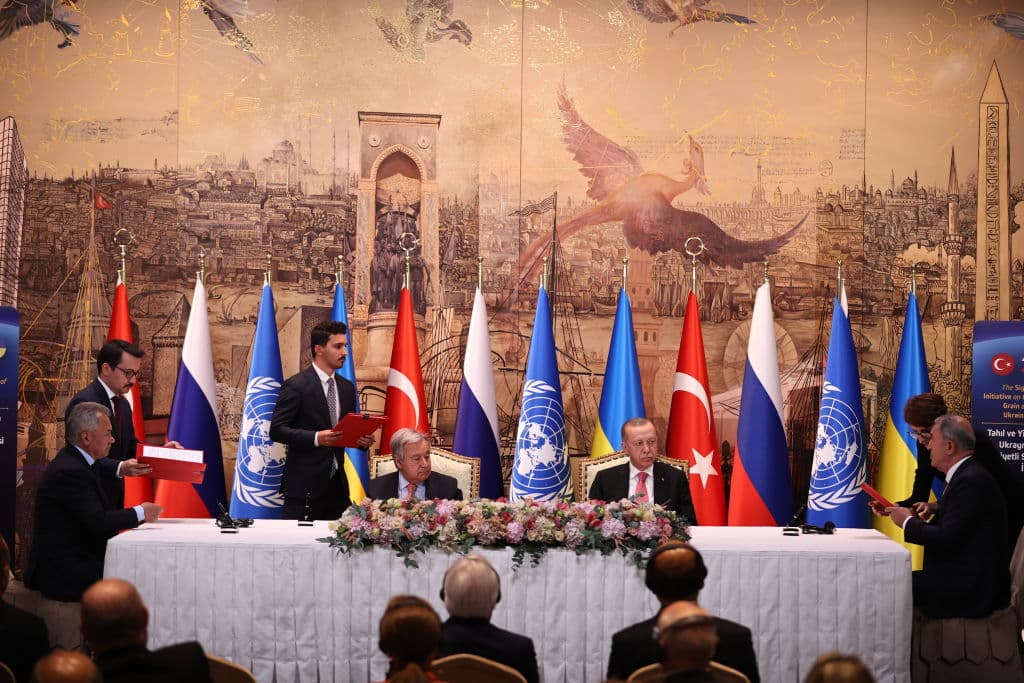Ukraine, Russia sign UN-backed grain deal but implementation uncertain

Ukraine and Russia on July 22 signed agreements to resume exports of Ukrainian grain through the Black Sea, a deal aimed at unblocking crucial grain exports and easing fears of a looming global food crisis.
During a ceremony at the Dolmabahce Palace in Istanbul, Ukraine’s Infrastructure Minister Oleksandr Kubrakov and Russia’s Defense Minister Sergei Shoigu signed separate agreements with Turkey and the United Nations.
The event was also attended by Turkish President Recep Tayyip Erdogan and UN secretary general Antonio Guterres. Erdogan said grain ship traffic should start in the coming days.
Guterres said he hopes the deal would “bring relief for developing countries on the edge of bankruptcy and the most vulnerable people on the edge of famine,” the Guardian reported.
The deal comes after two months of the UN and Turkey working closely with Ukraine and Russia to broker a grain deal amid growing fears of a food crisis that could push millions across the world to starvation. Russia’s war has blocked Ukrainian seaports through which 95 percent of Ukraine’s grain traveled abroad before the full-scale invasion.
As a result, some 25 million tons of Ukrainian grain have been trapped in silos across the country, disrupting the global food supply chains already battered by the pandemic and exacerbating famine in Africa.
If implemented, the deal would secure safe passage of Ukrainian grain and essential goods from three southwestern ports in Odesa Oblast: Odesa, Chernomorsk, and Pivdennyi. The agreement doesn't envision a Russian presence in these ports, nor those it allows Russia to escort Ukrainian grain out of the country.
The agreement, published by Ukrainian media outlet Ukrainska Pravda, doesn’t include any obligations to ease sanctions against Russia or for Ukrainian vessels to be escorted by Russian ships, both of which were strongly opposed by Ukraine in the weeks leading to the signing date.
Andrii Klymenko, head of the Institute for Black Sea Strategic Studies’ Monitoring Group, told the Kyiv Independent it is too early to assess whether the deal has the potential to free Ukrainian grain.
Many logistical hurdles remain, including the fact that both Russia and Ukraine have mined the waters around the ports. Guterres told Turkish NTV news that the agreed-upon grain corridor is valid for three months but can be extended if necessary.
Russia has also been accused of weaponizing food. Earlier, Moscow requested the lifting of sanctions in exchange for easing the blockade, which a U.S. official referred to at the time as “extortion diplomacy,” Politico reported in early June.
After news of the agreement was made public, the U.S. said it welcomed the deal and that it would focus on making sure that Russia implements it.
Read more: Ukrainian grain has nowhere to go as Russian blockade persists
Senior UN officials said the first shipments could bring five million tons of Ukrainian grain and other food-related products to the world market per month, the New York Times reported. This would potentially free up storage space in Ukraine’s silos crucially needed for this fall’s fresh harvests, according to officials who spoke with the New York Times.
As part of the deal, a coalition of Turkish, Ukrainian, and UN staff will monitor the loading of grain on the vessels at the ports before they depart using a map of safe channels navigated by Ukrainian pilot vessels, according to UN officials.
Ships entering Ukraine will also be inspected under the supervision of a Joint Coordination Center based in Istanbul in order to ensure that no weapons or items that could be used to attack the Ukrainian side are entering the war-torn country.
The accord signed by Kubrakov and representatives from the UN and Turkey will need to be approved by Ukraine's Cabinet of Ministers before it comes into effect.
Over a week ago, delegations from Ukraine and Russia held their first-ever direct talks on July 13 on the safe export of grain, where both sides saw some progress.
Read more: Ukraine, Russia achieve ‘some progress’ in grain blockade negotiations










